Categories
Archives
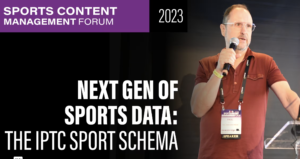
As we wrap up 2023, we thought it would be useful to give an update you on the IPTC’s work in 2023, including updates to most of our standards.
Two successful member meetings, one in person!
This year we finally held our first IPTC Member meeting in person since 2019, in Tallinn Estonia. We had around 30 people attend in person and 50 attended online from over 40 organisations. Presentations and discussions ranged from the e-Estonia digital citizen experience to building re-usable news content widgets with Web Components, and of course included generative AI, credibility and fact checking, and more. Here’s our report on the IPTC 2023 Spring Meeting.
For our Autumn Meeting we went back to an online format, with over 50 attendees, and more watching the recordings afterwards (which are available to all members). Along with discussions of generative AI and content licensing at this year’s meetings, it was great to hear the real-world implementation experience of the ASBU Cloud project from the Arab States Broadcasting Union. The system was created by IPTC members Broadcast Solutions, based on NewsML-G2. The DPP Live Production Exchange, led by new members Arqiva, will be another real-world implementation coming soon. We heard about the project’s first steps at the Autumn Meeting.
Also at this years Autumn Meeting we also heard from Will Kreth of the HAND Identity platform and saw a demo of IPTC Sport Schema from IPTC member Progress Software (previously MarkLogic). More on IPTC Sport Schema below! All news from the Autumn Meeting is summed up in our post AI, Video in the cloud, new standards and more: IPTC Autumn Meeting 2023
We’re very happy to say that the IPTC Spring Meeting 2024 will be held in New York from April 15 – 17. All IPTC member delegates are welcome to attend the meeting at no cost. If you are not a member but would like to present your work at the meeting, please get in touch using our Contact Us form.
IPTC Photo Metadata Conference, 7 May 2024: save the date!
Due to several issues, we were not able to run a Photo Metadata Conference in 2023, but we will be back with an online Photo Metadata Conference on 7th May 2024. Please mark the date in your calendar!
As usual, the event will be free and open for anyone to attend.
If you would like to present to the people most interested in photo metadata from around the world, please let us know!
Presentations at other conferences and work with other organisations
IPTC was represented at the CEPIC Congress in France, the EBU DataTech Seminar in Geneva, Sports Video Group Content Management Forum in New York and the DMLA’s International Digital Media Licensing Conference in San Francisco.
We also worked with CIPA, the organisation behind the Exif photo metadata standard, on aligning Exif with IPTC Photo Metadata, and supported them in their work towards Exif 3.0 which was announced in June.
The IPTC will be advising the TEMS project which is an EU-funded initiative to build a “media data space” for Europe, and possibly beyond: IPTC working with alliance to build a European Media Data Space.
IPTC’s work on Generative AI and media
Of course the big topic for media in 2023 has been Generative AI. We have been looking at this topic for several years, since it was known as “synthetic media” and back in 2022 we created a taxonomy of “digital source types” that can be used to describe various forms of machine-generated and machine-assisted content creation. This was a joint effort across our NewsCodes, Video Metadata and Photo Metadata Working Groups.

It turns out that this was very useful, and the IPTC Digital Source Type taxonomy has been adopted by Google, Midjourney, C2PA and others as a way to describe content. Here are some of our news posts from 2023 on this topic:
- IPTC publishes metadata guidance for AI-generated “synthetic media”
- Google announces use of IPTC metadata for generative AI images
- Midjourney and Shutterstock AI sign up to use of IPTC Digital Source Type to signal generated AI content
- Microsoft announces signalling of generative AI content using IPTC and C2PA metadata
- Royal Society/BBC workshop on Generative AI and content provenance
- New “digital source type” term added to support inpainting and outpainting in Generative AI
- IPTC releases technical guidance for creating and editing metadata, including DigitalSourceType
IPTC’s work on Trust and Credibility
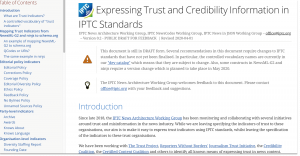
After a lot of drafting work over several years, we released the Guidelines for Expressing Trust and Credibility signals in IPTC standards that shows how to embed trust infiormation in the form of “trust indicators” such as those from The Trust Project into content marked up using IPTC standards such as NewsML-G2 and ninjs. The guideline also discusses how media can be signed using C2PA specification.
We continue to work with C2PA on the underlying specification allowing signed metadata to be added to media content so that it becomes “tamper-evident”. However C2PA specification in its current form does not prescribe where the certificates used for signing should come from. To that end, we have been working with Microsoft, BBC, CBC / Radio Canada and The New York Times on the Steering Committee of Project Origin to create a trust ecosystem for the media industry. Stay tuned for more developments from Project Origin during 2024.
IPTC’s newest standard: IPTC Sport Schema
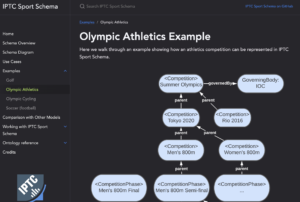
After years of work, the IPTC Sports Content Working Group released version 1.0 of IPTC Sport Schema. IPTC Sport Schema takes the experience of IPTC’s 10+ years of maintaining the XML-based SportsML standard and applies it to the world of the semantic web, knowledge graphs and linked data.
Paul Kelly, Lead of the IPTC Sports Content Working Group, presented IPTC Sport Schema to the world’s top sports media technologists: IPTC Sport Schema launched at Sports Video Group Content Management Forum.
Take a look at out dedicated site https://sportschema.org/ to see how it works, look at some demonstration data and try out a query engine to explore the data.
If you’re interested in using IPTC Sport Schema as the basis for sports data at your organisation, please let us know. We would be very happy to help you to get started.
Standard and Working Group updates
- Our IPTC NewsCodes vocabularies had two big updates, the NewsCodes 2023-Q1 update and the NewsCodes Q3 2023 update. For our main subject taxonomy Media Topics, over the year we added 12 new concepts, retired 73 under-used terms, and modified 158 terms to make their labels and/or descriptions easier to understand. We also added or updated vocabularies such as Digital Source Type and Authority Status.
- The News in JSON Working Group released ninjs 2.1 and ninjs 1.5 in parallel, so that people who cannot move from the 1.x schema can still get the benefits of new additions. The group is currently working on adding events and planning items to ninjs based on requirements the DPP Live Production Exchange project: expect to see something released in 2024.
- NewsML-G2 2.32 and NewsML-G2 v2.33 were released this year, including support for Generative AI via the Digital Source Type vocabulary.
- The IPTC Photo Metadata Standard 2023.1 allows rightsholders to express whether or not they are willing to allow their content to be indexed by search engines and data mining crawlers, and whether the content can be used as training data for Generative AI. This work was done in partnership with the PLUS Coalition. We also updated the IPTC Photo Metadata Mapping Guidelines to accommodate Exif 3.0.
- Through discussions and workshops at our Member Meetings in 2022 and 2023, we have been working on making RightsML easier to use and easier to understand. Stay tuned for more news on RightsML in 2024.
- Video Metadata Hub 1.5 adds the same properties to allow content to be excluded from generative AI training data sets. We have also updated the Video Metadata Hub Generator tool to generate C2PA-compliant metadata “assertions”.
New faces at IPTC
Ian Young of Alamy / PA Media Group stepped up to become the lead of the News in JSON Working Group, taking over from Johan Lindgren of TT who is winding down his duties but still contributes to the group.
We welcomed Bonnier News, Newsbridge, Arqiva, the Australian Broadcasting Corporation and Neuwo.ai as new IPTC members, plus a very well known name who will be joining at the start of 2024. We’re very happy to have you all as members!
We are always happy to work with more organisations in the media and related industries. If you would like to talk to us about joining IPTC, please complete our membership enquiry form.
Here’s to a great 2024!
Thanks to everyone who gave IPTC your support, and we look forward to working with you in the coming year.
If you have any questions or comments (and especially if you would like to speak at one of our events in 2024!), you can contact us via our contact form.
Best wishes,
Brendan Quinn
Managing Director, IPTC
and the IPTC Board of Directors: Dave Compton (LSE Group), Heather Edwards (The Associated Press), Paul Harman (Bloomberg LP), Gerald Innerwinkler (APA), Philippe Mougin (Agence France-Presse), Jennifer Parrucci (The New York Times), Robert Schmidt-Nia of DATAGROUP (Chair of the Board), Guowei Wu (Xinhua)
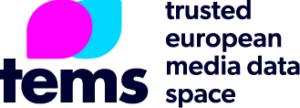
The IPTC is happy to announce that it will be working as an affiliate organisation of the TEMS project to build a Trusted European Media Data Space.
The product of a two-year-long tender and award process with the European Commission, TEMS is a joint undertaking of 43 organisations representing hundreds of stakeholders from 14 countries in the cultural and creative sectors, which aims to conceive and implement a common media data space across Europe.
The initiative is supported by the European Commission’s Digital Europe Programme (DIGITAL) and is a core element in the implementation of the European Data Strategy. With an investment of EUR 16.5 million, the consortium represents a milestone in the way the media sector will be able to share and extract value from data. By doing so, TEMS aims to support the economic development and future growth of local and regional media ecosystems across Europe.
Concretely, TEMS will lead the way for the large-scale deployment of cutting-edge services, infrastructures, and platforms. It will also address fighting misinformation, audience analysis, improving data flows in production chains, and supporting the adoption of AI and Virtual Reality technologies.
TEMS will evolve existing media platforms, embryonic data space infrastructures and provide open access to a common data space for any interested media stakeholder from any media sub-sector. This will help digital transformation and improve the competitiveness of the European media industry.
IPTC’s role is an advisory one. We will be working with TEMS partners on structuring data models and metadata formats, re-using and extending existing IPTC standards to create the framework the will power the data sharing for the media industry and beyond.
The TEMS partner organisations range from global news organisations to data platform providers, broadcasters, archives and media innovation units, as can be seen below.
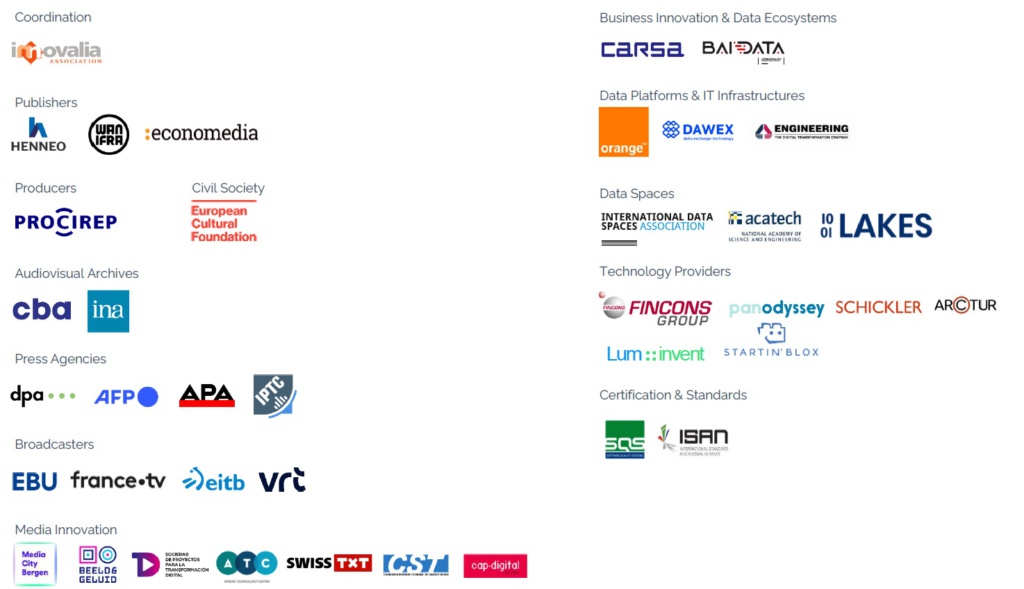
To follow news from the TEMS project, see http://www.tems-dataspace.eu/ or follow @TEMS_EU on X/Twitter.